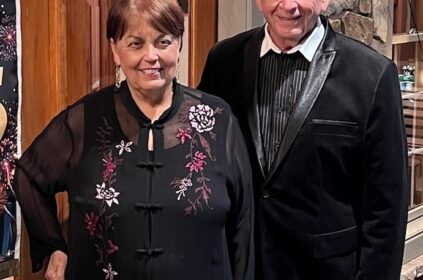WHATNEXT is grateful to our partner Elephants & Tea for providing the following article by Michelle Lawrence. Elephants & Tea‘s mission is to help adolescent and young adult (AYA) patients, survivors, and caregivers know they are not alone in their experience with cancer. The Elephant in the room is cancer. Tea is the relief conversation provides.
The light of the refrigerator blinded me. I was confused as to why it was so dark; I had just awakened from a nap. A nap that I had not planned. Sleep sometimes attacks me; I call them sleep attacks. New England winters are dark and dreary; the sun sets very early. I had woken up starving. Looking at the clock and back into the fridge, I could conclude it was dinner time. Whoever invented the rule that you are supposed to eat three times a day is a jerk. All the steps involved in feeding yourself are sometimes overwhelming. Consider the steps: planning what you eat, grocery shopping, staying on a budget, and food prep, to name a few. I slammed the fridge door in frustration. There was nothing quick and easy, and I was exhausted. A nap wasn’t enough for my pesky fatigue. Cancer was kicking my ass that day. Adulting wasn’t working. I did not have the energy to cook, but I also had no energy to make choices or problem-solve. What to eat for dinner felt like a calculus problem. Did I mention I suck at math?! I stumbled back to the couch, laid down, and fell asleep. I woke up again a few hours later, repeating the vicious cycle. This time, I figured the answer had to be a banana and a vitamin, so that was my dinner that evening.
Adulting is challenging enough. Life is unpredictable, and things change so rapidly that you must constantly be changing. It’s exhausting and requires a lot of executive functioning. Having a routine, planning, organizing yourself, and being prepared can ease some stress. However, add cancer to the mix, and it’s adulting on steroids. Buckle-up, buttercup. You are going for a ride.
Adulting tasks that you used to complain about now seem trivial. Instead of planning what’s for dinner, you are now choosing how to stay alive. You are learning about your diagnosis and prognosis, selecting a treatment or maybe deciding not to treat, learning about things you never dreamed about, and trying to retain all this new information. You do all this feeling like a bus ran you over, dragged you for a few blocks, and dropped you off in the middle of the desert. Of course, anytime I have to make a big decision, I wonder whether the treatment will kill me or if the cancer will. Then, picking an entrée for dinner seems pointless. Picking what to eat for dinner is no longer an easy choice. When you get to the dinner decision, you must now consider what foods won’t make you sicker or won’t hurt your mouth sores—no more fast food or ordering out. Out of nowhere, you have also developed an intolerance for specific smells, tastes, and textures, so your list of safe foods keeps getting smaller and smaller. If life serves you up cancer with a side of adulting, your plate will end up overflowing, but that’s 100% okay.
Cancer makes adulting hard because it attacks your body and your brain; nothing is left untouched, from your toenails to your heart. One example is that often, folks who undergo chemotherapy experience brain fog, which is not a joke! I am one of those lucky folks; brain fog is something I battle regularly. I sometimes wonder what’s worse: cancer or the side effects of treatment. My brain fog causes simple tasks to become complex; my bills would remain unpaid if it weren’t for automatic withdrawal. Any unexpected bills go into the infamous mail pile, which grows and grows until I can’t see the table. The adult in me knows I should address the situation, but the cancer in me holds me back! When you have cancer, little tasks like taking a shower or getting dressed, tasks you didn’t even really think about before, now have become equally as tricky as making dinner. Quite frankly, it can be maddening sometimes, and at other times, I just laugh at myself.
Yes, you learn tricks and tips from others who have gone before you, but you won’t be able to do it all. No one can, with or without cancer. Adulting is complex; we often joke about it, but it means handling some big stuff. Why we try to force ourselves to do it all is beyond me. Forget about being the perfect adult or being able to be an adult every day. Eventually, the bills will be paid, the laundry will be done, and the house will be cleaned. If it’s not or you can’t, you ask for help. Will your bills be paid and neatly filed alphabetically and color-coded on a Tuesday at 10:46 am? Probably not, but you learn not to care. I used to be uber-organized, but now I aim for ‘not too cluttered.’
Don’t fret. Adulting with cancer is possible, but it has to be broken down into steps that work for you. Adulting is a messy process, and cancer makes it messier. You must be willing to get dirty, avoid perfection, and be okay with asking for help. Teamwork makes the dream work. Sorry for the cliché, but it is true! Am I the best at asking for help? No. It takes practice. I should have a backup plan for dinner besides bananas and a vitamin pill.
To be transparent, there are some days I do care that I can’t adult to the level my peers are and have broken down crying in frustration. Some tasks that should’ve been completed two weeks ago resurface; it has become a ‘now’ issue because I couldn’t do it all. One task I had put off was writing this article. I could beat myself up or try my best to get it finished. If this gets published, I will have made it through the day without a sleep attack. It means I did it all sitting in my favorite chair in Halloween leggings, a Christmas sweatshirt, hair in a messy bun, and hungry because I forgot to eat lunch. If I recall correctly, I had forgotten to brush my teeth that morning, but I did brush them before bed. It was getting dark out again. I hadn’t made dinner plans, and I was in pain and tired. Damn calculus. Thank goodness for bananas and vitamins.
Editor’s Note: Get Involved
Cancer doesn’t discriminate. WHATNEXT and its partners are interested in amplifying the voices of those from all identities and backgrounds. If you have a cancer journey to share, reach out here to learn more about how your voice can help spread awareness and inspire individuals from all walks of life.
chronic lymphocytic leukemia Elephants & Tea leukemia patient stories
Last modified: May 12, 2025











